
Word studies are an important aspect of any Bible study plan. The meaning of words, especially those in Hebrew and Greek, often have layers of meaning that are missed in the translation into English.
For example, some translations render Philippians 2:5, “Have this MIND in you which was also in Christ Jesus” (KJV, NKJV, ESV, NIV), whereas others say “Have this ATTITUDE” in you …” (NASB, CSB, NLT).
So which is correct?
Technically, both options. The Greek word phroneō contains the ideas of mind (thinking/understanding), attitude, feeling, and having an opinion. As you examine the word further, it gives the emphasis of “orientation and focus of living”—how one lives (which includes the mind and attitude).
So translators did translate the word correctly, but there is a deeper nuance to the word.
Paul commands us to have the same mind, attitude, orientation, and focus of Jesus—then continues in verses 6-8 explaining what the phroneō of Jesus looked like.
It should make sense, but the more basics you have of grammar, original languages, and linguistics the easier word studies will be in Scripture. But don’t fret! While knowing the basics gives you a head start, this can be a wonderful opportunity to learn as you grow.
While many of us try to forget our sixth grade grammar lessons, knowing how English grammar works will help you understand (at least in a simple sense) Greek grammar. If you don’t already know, you might want to refresh yourself on what a noun, verb, adjective, and adverb is. When you look at a sentence, can you identify the subject (the main person/object) and the main verb (action)?
During Bible study, it is important that you observe the text. And as you make observations, inevitably you will come across words that you don’t understand.
Don’t skip or presume you understand what they mean … do a word study.
The purpose of doing a word study is to figure out what the author was writing in the original language. This can be as complex as you want to make it (diving into grammar, syntax, and Hebrew or Greek)—but even for basic Bible study it is still important to understand how to do a simple word study. And doing so will cause the Word of God to open up in incredible ways as you understand the words themselves.
Important reminder: while word studies are important, the words themselves must be understood in context. Without the context, we can easily misunderstand or get “weird” in our understanding of a passage.
There are many free online Bible resources that are great to use for word studies, by one of my favorites is BlueLetterBible.org (they also have an app version).
Below is a simple beginners guide to using BibleLetterBible and it presumes you have a basic understanding of Bible study itself.
For this example, we are going to look at the word “thanks” found in Colossians 1:3 (I will be using the NKJV).
Basic context: Paul (the author) is writing to the Christians in Colosse (called Asia Minor in Paul’s day … which is modern day Turkey). After giving his greeting (1:1-2), Paul writes in 1:3 –
We give thanks to the God and Father of our Lord Jesus Christ, praying always for you, …
It is important to note that the “thanks” is being given by Paul and Timothy (1:1) to God for the believers in Colosse. So this isn’t some random thanksgiving but rather purposeful thanks for a particular reason to a specific Person (God).
Let’s do a word study on “thanks.”


The Bibles tab is great as it allows you to read your passage in a variety of translations. This can be a good way to see how different translations translate the verse (see Philippians 2:5 example above) and see potential words that may have nuances in the original language (though reading the English isn’t always a guarantee you will discover meaning or nuance).
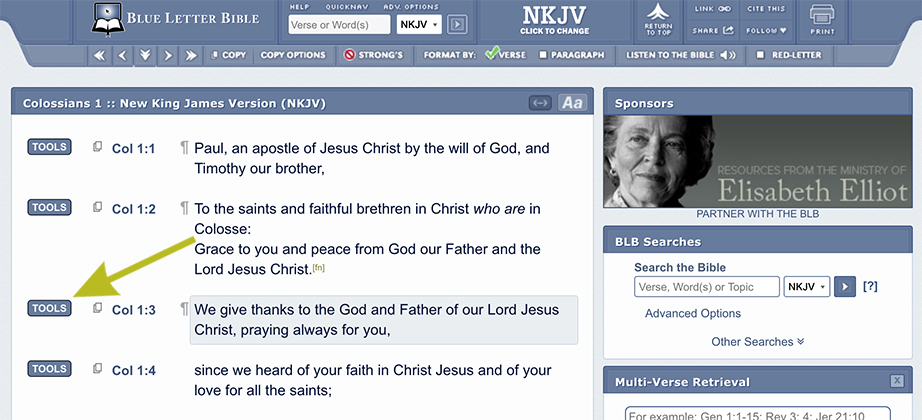
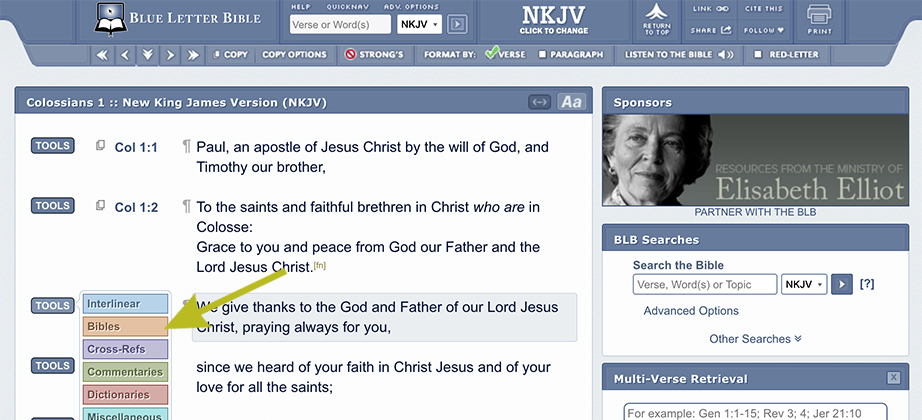
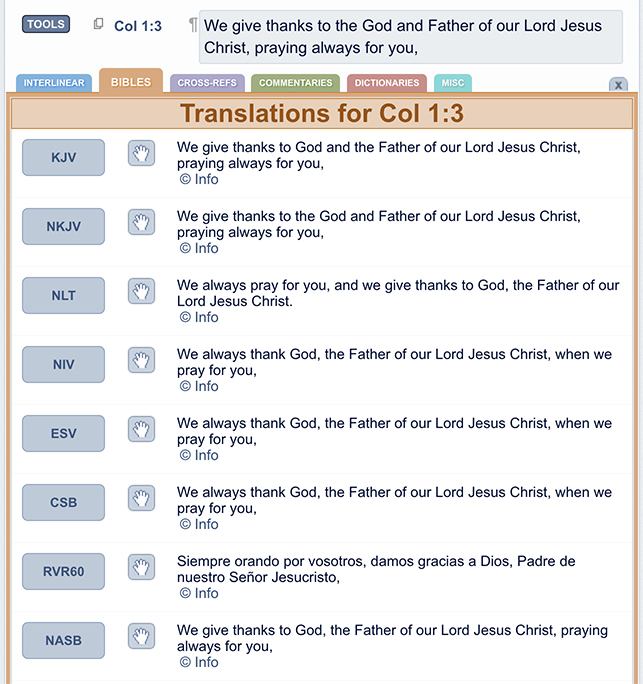
The default is “reverse interlinear”—which shows the English order in either the KJV or NASB with the Greek word to the right.
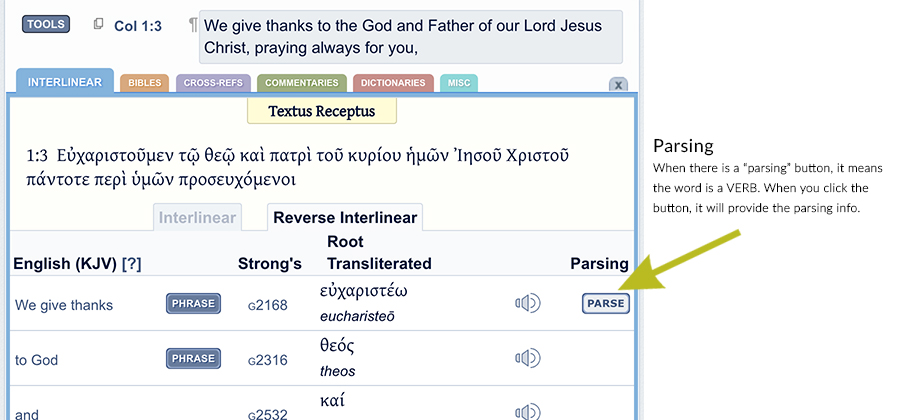
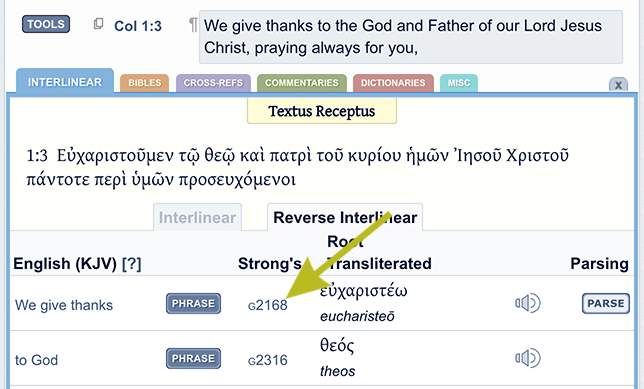
This opens up a lexicon (Greek dictionary) view of our word.
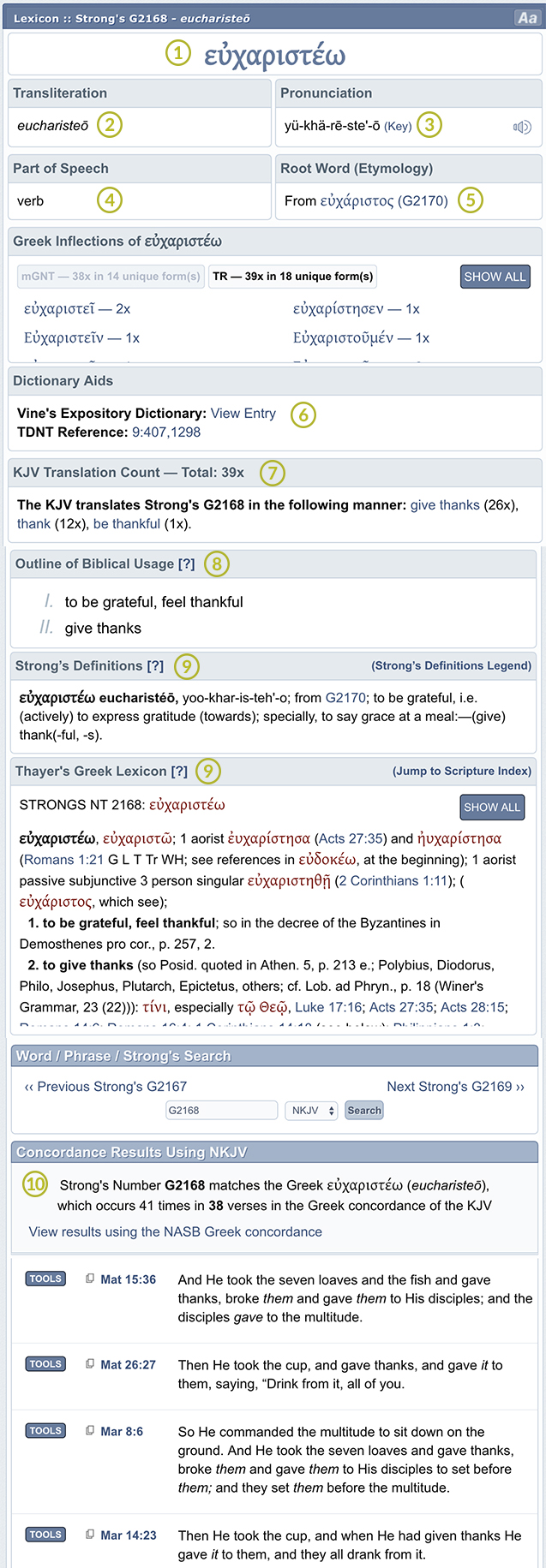
Now that you have a bunch of information, what do you do with it?
Colossians 1:3 says that Paul and Timothy thank God and pray for the believers in Colosse (note that greater context and clarification is given in verses 4-8).
Simply, Paul and Timothy are expressing appreciation and gratitude to God for all He has done in the lives of the believers in Colosse. It is not so much because of something the Colossians did, rather, the thanksgiving is in what God has done in and through them.
Just as there is tremendous thanksgiving and rejoicing for what Jesus did upon the cross (and which we celebrate in taking communion / Eucharist) so too the hearts of Paul and Timothy are full of thanksgiving, gratitude, and praise for the work God is doing in the lives of the saints in Colosse.